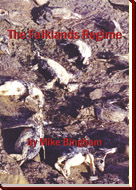 |
 |
| |
|
| HE The Governor Government House Stanley Falkland Islands 7th June 2002 Your Excellency I am writing to you to express concern about the starvation and decline of Falkland Islands penguins. During April and May of this year, large areas of the Falklands have become littered with the bodies of dead penguins. An examination of affected areas shows that between 25% and 50% of Rockhopper penguins have died, and about 10% of Gentoo penguins. Even allowing for areas that were not affected, we conclude that at least 100,000 penguins have probably died. Examination of the affected sites also confirmed that starvation was the cause. Some birds barely alive, still undergoing their moult in June, were too weak to walk. Vultures and caracaras were watching over them waiting for them to die. The average weight of dead Rockhoppers was under 2kg, and dead and dying Gentoos weighed just 4kg. Samples sent to the Veterinary Department were examined, confirming no signs of illness or injury other than starvation. The last mass starvation of Falklands penguins occurred in 1986, and penguin populations have never recovered from this event. Even though such events are not a regular occurrence in the Falklands, they should not be happening at all. There are some penguin species (Galapagos and Humboldt) which are prone to occasional mass starvation due to natural cycles, however these species have evolved the ability to reproduce rapidly during intermediate years, laying 2 eggs up to three times per year. Rockhoppers have evolved a breeding strategy of slow but sure, concentrating on rearing one healthy chick per year. This is a breeding strategy adapted to a stable environment, requiring low adult mortality and reliable food resources. If Rockhopper populations are reduced through adult starvation, they take decades to recover, as we have seen in the Falklands since the 1986 event. However, the occasional mass mortality of adult penguins is just the tip of the iceberg. Less dramatic is the starvation of hundreds of thousands of penguin chicks, which occurs every year in the Falklands. I began studying penguin populations in South America in 1996 to see if such large scale starvation of chicks was normal. This research, combined with work done by others, shows that it is not. Magellanic penguins in particular cannot sustain the high levels of chick starvation that have occurred in the Falklands over reason years, and their populations have plummeted. Magdalena Island in Chile is the nearest colony of Magellanic penguin burrows to the Falklands. Many years ago commercial fishing was permitted around the island, and the penguins declined. Then the Chilean government declared Magdalena Island a nature reserve, and established a no-fishing zone around the island, since when penguin populations have flourished. With Magdalena Island now protected from commercial fishing, Magellanic penguins can find food for their chicks in just 14 hours. By comparison, Magellanic penguins in the Falklands spend over 30 hours collecting the same amount of food, and are forced to forage much further away from their colony. What is potentially worse, is that in the Falklands these adults are unable to find sufficient fish and squid, which is the preferred food for their chicks. As a result they feed their chicks lobster krill, which is presumably better than returning with nothing, but lobster krill is very indigestible for chicks, and chicks cannot survive on a diet of lobster krill. With chicks in the Falklands receiving less than half the amount of food, much of which is of a type that is indigestible to chicks, it is not surprising that most of the Magellanic penguin chicks in the Falklands starve every year. In Chile an average of 1.4 chicks per nest survive, whilst in the Falklands it is less than half that, averaging only 0.7 chicks per nest over the last 12 years. Studies from other sites, such as Seno Otway, confirm the differences observed, with Magellanic penguins there finding food for chicks in less than 9 hours, resulting in an average of 1.6 chicks per nest over the last 6 years. In 1982, British troops sent to the Falklands were told they were liberating an island of 2,000 people and 6 million penguins, a figure supported by Croxall JP, McInnes SJ & Prince PA (1984) in The status and conservation of seabirds at the Falkland Islands, ICBP Technical Publication No.2, 271-291, ICBP, Cambridge. Penguin censuses conducted in 1995 and 2001, confirm that these 6 million penguins (3 million pairs) have crashed to less than 1 million (500,000 pairs) over the last 20 years. This decline is a result of the mass starvation of adult penguins in 1986, coupled with excessive starvation of chicks and juveniles each year since, so that adults dying of natural causes are not being replaced. This starvation of adults and chicks, and the decline of penguin populations, began with the establishment of commercial fisheries around the Falklands (not just since commercial fishing became regulated in 1988). Other species dependent on fish and squid have also declined over the last 20 years, such as cormorants and elephant seals, whilst King penguins and Fur seals, that forage on species not taken commercially, have flourished. Twelve years of diet-sampling shows that there is considerable overlap in the diet of Magellanic penguins, which have declined most severely over recent years, and the commercial fishing industry. We believe that the scientific evidence is very strong that commercial fishing activities are having a negative impact on penguin populations, through competition for food resources, especially in the case of Magellanic penguins. The Spheniscus Penguin Conservation Workshop, a consortium of penguin biologists from around the world, has reached the same conclusion, and in September 2000 they called on all nations with Spheniscus penguins (Magellanic, African, Humboldt and Galapagos) to establish a 30 mile no-fishing zone around known breeding sites. Research from around the world shows that Spheniscus penguins (along with Gentoos and Rockhoppers) forage within 30 miles of their colony whilst rearing chicks, unless a depletion of resources forces them to forage further afield. This is the most critical time to conserve prey close to shore. During chick rearing, adults are limited as to how far from the nest they can forage for two reasons. Firstly, the further they forage, the more time (and energy) they waste swimming, so the less food brought back to chicks in any given period. Secondly, penguins do not have crops like other birds, so all the prey they catch goes straight into the stomach. As a result, the further away from the nest they catch food, the more it will have been digested by the time it gets fed to chicks, especially when adults are expending more energy through swimming further and foraging longer. During egg incubation and early chick rearing, one adult must remain on the nest, so each adult only has half the amount of time to forage. Adult penguins will forage to meet their own metabolic needs first, so chicks rely on adults catching a surplus of food with which to feed chicks. The further that penguins need to swim to find prey, and the more time and energy spent catching prey because of reduced abundance, the less chance adults have of catching sufficient surplus to keep chicks fed. The Falkland Islands Government Fisheries Department manages squid and fish stocks by recording catch per unit effort. As commercial fishing gets underway, the abundance of target species drops, so boats take longer to catch the same amount of food. Clearly penguins feeding on this same squid and fish also suffer from this drop in catch per unit effort, and are forced to spend longer catching the food needed by themselves and their chicks. It would be unreasonable to suppose that commercial fisheries could remove large quantities of fish and squid from any part of the world, without having an impact on seabirds and marine mammals that feed on these species. Numerous scientific publications show that Spheniscus penguins in particular suffer from commercial fishing too close to breeding sites. We therefore urge the Falkland Islands Government to establish a 30 mile no-fishing zone around all major penguin colonies during the months of October through to February. This would keep the primary foraging areas required during breeding free of commercial fishing vessels, reducing the competition which exists between commercial fishing vessels, and seabirds such as penguins and cormorants. Such protection would reduce the available fishing grounds by less than 3%, for 5 months of the year, and a 3% reduction in fishing grounds does not mean a 3% drop in income or catch. On the contrary, as any population biologist will confirm, providing a "safe-haven" is a very good way of preventing accidental over-exploitation of target species by commercial fisheries. We therefore believe that the disadvantages of implementing such protection would be minimal, whilst the gains would be great in terms of wildlife protection, fisheries management, and international goodwill. Despite recent concerns over finances, the Falkland Islands are wealthy. With an annual income to the Treasury of over �20,000 per capita, financial shortfalls derive from problems in managing expenditure, not a lack of income. Chile by comparison is a very poor country, with a per capita income to the Treasury of but a tiny fraction of that which the Falklands enjoys. Nevertheless, it has taken measures to protect its penguins from commercial fishing, through the establishment of a no-fishing zone policy, which has yielded results in an up-turn in penguin populations. The Environmental Research Unit therefore urges the Falkland Islands Government to adopt similar measures to protect Falklands penguins. I have forwarded a manuscript to the Falkland Islands Government which I wrote for publication shortly before the recent mass starvation of so many penguins. It provides some of the scientific background that supports our petition. I have asked Gilbert House to forward you a copy of this manuscript, but ask that you treat it as commercially confidential, since it is still in press. Yours sincerely Mike Bingham CC. |
|
|||||||||||||||||||||||||||||



